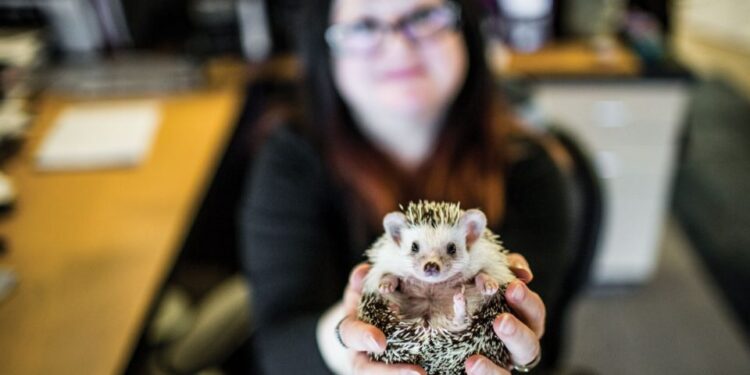Some of the names spoken about at the marketing firm Envoy might seem unorthodox: Adam, Steve, Stella … and Butter? These names don’t belong to people, but to a pair of Devon rex cats, a French bulldog/pug, and a mini goldendoodle. Dentists have kept tropical aquariums in their waiting rooms for generations, but expanding a workplace’s pet-tential is far more common than that.
Penny Hatchell and Kathy Broniecki have owned Envoy for 13 years, producing materials for clients as varied as Hiland Dairy, Boys Town, and Max I. Walker Cleaners. The decision to allow pets in the office came from the desire to create a flexible and welcoming work environment: “We love to come to work, and we want our employees to come to work,” Broniecki explains. The decision seems to be working for them: “There’s a much greater overall wellness to the office—our quality and productivity has improved, and it keeps things light.”

The animals are great for keeping employees happy, or helping employees who have a bad day cheer up.
“This has been studied and we can see that animals have value in emotional therapy, or to be assistant animals in places like nursing homes,” says Teresa T. Freeman, a therapist in Omaha. “They have noticed a positive effect in studies pets have on people in isolated situations to help boost their mood, wellness, and even improve physiology—things like heart rate, blood pressure, and other stress responses.”
The cats were rescued and considered part of Envoy, while the dogs and a hedgehog are others’ personal pets.
Broniecki says the company is reasonable about how having pets around can affect productivity, too: “It’s natural to get distracted at work, and focusing too hard can just make things worse. Getting by distracted by the pets is a much more positive outlet than other options,” Broniecki says.
Perhaps the greatest boon to Envoy has been the camaraderie the animals’ presence has built. “One stormy day,” Broniecki says, “Adam the cat went missing. It became an all-hands-on- deck situation in that moment trying to find him.” Everyone keeps treats on their desks for them, and when the dogs arrive in the morning, they make sure to greet every employee first thing, desk by desk. Hatchell, who takes the cats home with her when the day is over, adds: “even over the holidays, I’ll get texts asking how they’re doing, and even requesting pics.”
That camaraderie is a common bond between employees and furry friends, and can be a way to connect with shyer clients or new staff members.
“It breaks down barriers,” Freeman says. “People may not be comfortable with where they’re at emotionally, or isolated.”

Envoy is not alone in enjoying the pet perks. At J.A. McCoy CPA (located off 90th and Maple streets) Julie McCoy, in partnership with her rescue dog JoJo, tackles that lightning rod of stressful situations—taxes. McCoy has kept a dog at work since day one of starting her firm. “We work a lot of long hours, and dealing with taxes and estates is often not a fun experience. But with JoJo here, people look forward to coming in,” she says. Like at Envoy, McCoy has seen the same positive influence in her office: “Clients love it–we get a lot of business by word of mouth because of JoJo.” And of course, employees are encouraged to have play time. “We’re doing stuff that requires a lot of concentration, so it’s good to have a break.”
Pam Wiese, V.P. of public relations for the Nebraska Humane Society, also believes that having pets in the office can do wonders to reduce stress. “Focusing on something that isn’t another person, like the nurturing qualities of animals, can help calm people down.” Pets, she says, provide an element of levity that certainly has value in defusing tense work scenarios. She brings her own dog to work every day, but cats, fish, and even critters can all contribute. “We once had a bearded dragon here in the office. He’d sit out on his rock and sunbathe while people came to visit him over their lunches,” Wiese says. Though the NHS has not made any concerted push to get animals into offices, they have had their share of interested parties looking to adopt. “We’re happy to work with people to find an animal for them,” she says, “as long as it’s an appropriate situation.”
There are certainly many factors to weigh before introducing a pet into your own office. “Animals need to be comfortable,” Weise says. If the conditions aren’t safe or comforting for the pet, that opens up the opportunity for additional problems, like becoming loud or aggressive. If you’re going to have a pet, they will need to have their own private space and occasionally training to cope with many active people surrounding them. There’s also the human factor to consider: not everyone is an animal lover. “You’ll need to be considerate of the phobias, allergies, and even prejudices of the people passing through your workplace.”
McCoy, Broniecki, and Hatchell were all able to speak to experiences with clients that turned sour because of their furry compatriots, but also noted that they were few and far between. “Only one client of ours didn’t want to come to the office because we had cats,” Hatchell explains. Similarly, McCoy shared that she did have clients with phobias: “We always try to be upfront and communicate ahead we’re a pet-friendly office. When a client comes in that has trouble with that, we make sure JoJo stays in her ‘office’ [and she does have an office, nameplate and all].”
Regardless, they were each in confident agreement: their pawed pals have been a big plus for their businesses.

This article was printed in the Spring 2017 edition of B2B.













